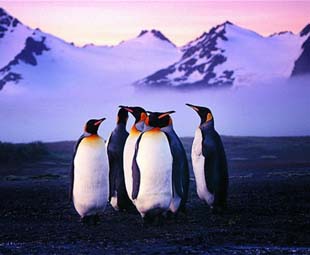The population of Antarctica's penguin is in danger of global warming, World Wild Fund for Nature (WWF) said on Tuesday at the ongoing U.N. climate change conference held in Bali, a resort island of Indonesia.
Global warming is taking a way precious ground on which penguins raise their young. Food has become increasingly scarce because of warming in the conjunction with overfishing, WWF said in a press release quoting its latest research report.
The report, "Antarctic Penguins and Climate Change," said the four species of penguins that breed on the Antarctic continent are under escalating pressure. The Antarctic peninsula is warming five times faster than the average rate of global warming. The vast Southern Ocean has warmed all the way down to a depth of 3,000 meters, it said. The report said sea ice covered 40 percent less area than it did 26 years ago off the West Antarctic Peninsula. This decrease led to reduced numbers of krill, the main source of food for the chinstrap and penguins.
Warmer temperatures and stronger winds mean the penguins had to raise their chicks on increasingly thinner sea ice. For many years, sea ice has broken off early and many eggs and chick have been blown away before they were ready to survive on their own. "The Antarctic penguins already have a long march behind them," Anna Reynolds, deputy director of WWF's Global Climate Change Program, said in a statement at the Bali U.N. climate talks.
"Now it seems these icons of the Antarctic will have to face an extremely tough battle to adapt to the unprecedented rate of climate change," he said.
The number of chinstraps decreased by 30 to 66 percent in some colonies, as less food made it more difficult for the young to survive. It's the same story for Gentoo penguins, who are increasingly dependent on the declining krill stocks as overfishing kills off their usual food source, according to WWF.
The emperor penguin, the largest and the grandest in the world, has seen some of its colonies halved in size over the past half century.
In the northwestern coast of the Antarctic peninsula, where warming has been the most dramatic, populations of Adelie penguins have dropped by 65 percent over the past 25 years, WWF said.
"The food web of Antarctica, and thus the survival of penguins and many other species, is bound up in the future of the sea ice," said James P. Leape, director general of WWF International.
"After such a long march to Bali, ministers must now commit to sharp reductions in carbon emissions for industrialized countries, to protect Antarctica and safeguard the health of the planet," he said. The two-week U.N. climate change conference is tasked with drawing up a "roadmap" for negotiations on a new climate deal in the next two years before the current phase of the Kyoto Protocol expires in 2012.
(Xinhua News Agency December 11, 2007)






